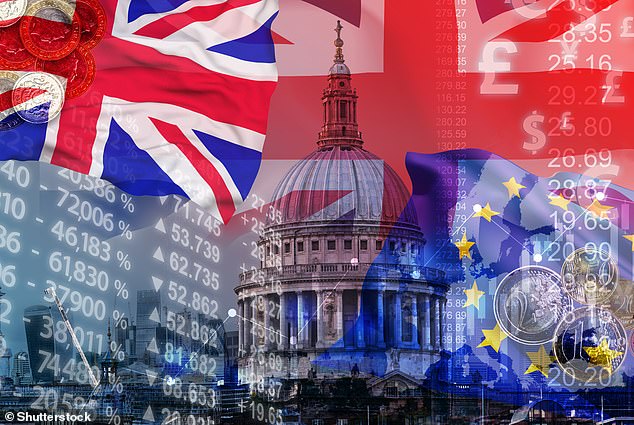
A ‘soft landing’ – that’s what the financial markets reckon the world economy will achieve this year, and I think they may be right.
The idea is this. The world’s central banks have to tread a narrow line. On the one hand there is the danger they will clonk inflation too hard on its head by pushing up interest rates, leading to a housing slump, corporate bankruptcies, a sharp rise in unemployment and, the dreaded R-word, recession. That would be the hard landing this summer.
On the other hand, they may be lulled into complacency by falling headline inflation, and ease off too soon, only to have to jack up rates again at the end of the year. That, in turn, might lead to a hard landing next year.

Raise a glass: A ‘soft landing’ is what the financial markets reckon the world economy will achieve this year
Between the two is the hope that they will do enough to control inflation, helped by falling energy and commodity prices, so that the slowdown this summer will be just that: a slowdown, not a recession. That is the soft landing.
In the past few days, there have been some encouraging signs. Here in the UK, the economy kept growing in November, suggesting that it might not have been in recession in the second half of last year.
I have long felt we might squeak through last year without one, and it would be nice to have that view come right.
Much the same seems to be happening in Germany: it looks as though there was no recession in 2022. Over in the US, inflation is falling sharply and is now down to 6.5 per cent.
That will take some pressure off the Federal Reserve to be overly aggressive in increasing rates. We will get the UK numbers this week, and the question here is really how fast they are coming down – see our story on that below.
If you want to take one indicator of the way markets are responding to this flow of encouraging news, it is the FTSE100 index. The Footsie closed on Friday at 7,844 – within a whisker of its all-time high of 7,877 on May 22, 2018. About time too, I say, for UK assets are still substantially undervalued by world standards.
Clearly the 8,000 level is looming into sight, and assuming no serious world recession this year, the market could go well beyond. Remember, most of the earnings for the Footsie companies come from outside the UK, so this is also a reflection of demand in the world economy.
The big message is that even if there is a recession, it won’t be a bad one, and that the UK will do better in the months ahead.
Dean Turner, chief UK and Eurozone economist at UBS Wealth Management, put the point well in a note on Friday. He wrote: ‘The economic reality will likely be less bad than the headlines suggest. Furthermore, we believe that UK equities can continue to perform well in the coming months. We also see better times ahead for the pound.’
I think that is right, and is a welcome relief from the relentless gloom from too many commentators. But I do acknowledge that there are genuine concerns, not so much about this year but the three to five-year prospect beyond. There is an economic cycle. There will be some sort of dip and then there will be renewed growth. But the upswing of this coming cycle will butt into two serious headwinds.
First, the world is carrying a huge burden of debt: households, corporations, governments and so on. If, as I expect, the world reverts to positive real interest rates – interest rates that are higher than inflation – that will create serious problems for the over-borrowed.
Second, while the push-back against globalisation makes sense – why make something on the far side of the world when you can get it made round the corner? – it will increase costs.
The idea of ‘near-shoring’ and ‘friend-shoring’ instead of offshoring is seductive, but globalisation has been one of the drivers of higher living standards. It will be tough to preserve the best aspects of a freely-trading world economy against what looks like being an increasingly difficult political climate.
So let’s raise a glass when the Footsie does go to a new high, and another when it goes through 8,000. There is a slog ahead. But a soft landing is much better than a hard one.
Some links in this article may be affiliate links. If you click on them we may earn a small commission. That helps us fund This Is Money, and keep it free to use. We do not write articles to promote products. We do not allow any commercial relationship to affect our editorial independence.






